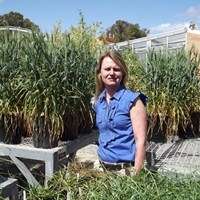Strategies to reduce greenhouse gas emissions must be financially attractive

Incorporating a grain legume in a two-year cropping rotation decreased greenhouse gas emissions from wheat production, according to a study by researchers from The University of Western Australia.
Greenhouse gas emissions from agriculture production are predicted to increase as the world's population grows and demand for food increases. The nitrogen-fixing grain legumes lower the need for nitrogen fertilizer without compromising yield.
However, economic analysis showed that a large incentive was required for this strategy to be financially attractive.
Associate Professor Louise Barton and Tas Thamo from UWA's Institute of Agriculture and School of Earth and Environment, together with colleagues Dr Wahidul Biswas and Deborah Engelbrecht from Curtin University's Sustainable Engineering Group, investigated strategies for decreasing greenhouse gas emissions resulting from the use of nitrogen fertilizers in dryland cropping systems of Western Australia.
Specifically, they investigated if including commonly grown lupin in the cropping rotation, or applying lime to increase soil pH, decreased the life cycle global warming potential of wheat in Wongan Hills in the WA grainbelt.
Dr Biswas and his PhD student Mrs Engelbrecht of Curtin University were involved in the life cycle assessment component for estimating greenhouse gas emissions of wheat production from the lupin-wheat rotations utilising data provided by UWA's Associate Professor Barton.
Semi-arid and arid regions represent one third of global land area and are widely used for grain production. Yet little attention has been given to developing strategies to minimise greenhouse gas emissions from these regions.
Associate Professor Barton said that previous research on greenhouse gas mitigation strategies from soils in semi-arid regions is limited or has relied on theoretical rather than regionally-specific field data like her team had done.
"We used locally derived field-based measurements of greenhouse gas emissions for a range of climates and soil types from our previous research and conducted a streamlined life cycle assessment analysis," Associate Professor Barton said.
"This is important because it gives a realistic picture based on which we can develop strategies that farmers will actually adopt."
The results showed that including the commonly grown legume lupin in a two-year cropping rotation reduced emissions by 56 per cent on a per hectare basis and 35 per cent on a per tonne of wheat basis. Applying lime to raise soil pH was profitable but increased total greenhouse gas emissions from wheat production by varying amounts depending on the time that lime was assumed to dissolve.
The researchers assessed the economic viability of the strategy a found a large incentive of $93 per tonne of carbon dioxide equivalents reduced was required for the inclusion of grain legumes to be financially attractive.
According to co-author Mr Thamo, this is much larger than contemporary global carbon prices. "Greenhouse gas mitigation strategies are only effective if they are economically viable," he said.
"Our findings demonstrate that while there are land management strategies available to lower greenhouse gas emissions from grain production in semi-arid climates, economic incentives are required to encourage adoption by farmers."
More information: The paper: Does growing grain legumes or applying lime cost effectively lower greenhouse gas emissions from wheat production in a semi-arid climate? was recently published in the Journal of Cleaner Production : DOI: 10.1016/j.jclepro.2014.07.020
Journal information: Journal of Cleaner Production
Provided by University of Western Australia














